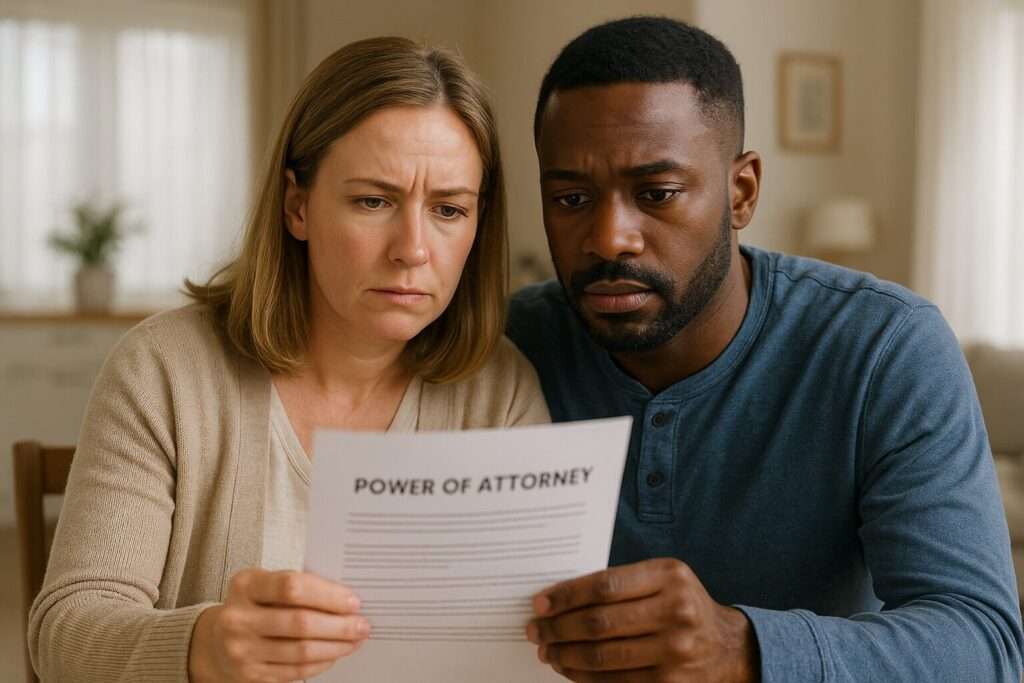Florida Durable Power of Attorney – Hassle-Free, Ready-to-Use, and Done Right
Why a Durable Power of Attorney Matters More Than You Think
Life has a way of throwing us curveballs — a sudden illness, an unexpected hospital stay, or memory issues that come on slowly.
With a DPOA in place, you decide who can step in, and you make it easier for them to act when it matters most.

Without a Florida Durable Power of Attorney (DPOA), the people you trust could be left unable to handle your finances, pay bills, or take care of important matters on your behalf.
Say Goodbye to the Hassle
We know what it’s like to think, “I should get this done… but it sounds complicated.”
That’s why we’ve created a clear, friendly process that takes the paperwork stress off your shoulders.
Here’s What We Handle for You
Preparing your DPOA according to Florida’s exact formatting and signing rules
Ensuring it’s complete, accurate, and ready for signing
Providing online or in-person notarization
Offering Verified Vault Access for secure, long-term storage
No guessing. No hunting for the “right” form. Just a finished, Florida-compliant document ready for use.
What a Florida Durable Power of Attorney Does
A DPOA is a written document where you (the Principal) name someone you trust (your Agent) to handle legal and financial matters for you.
The “durable” part means it remains valid even if you become incapacitated — something your family will thank you for during stressful times.
Common Powers Granted
💳 Pay bills, manage bank accounts, and oversee investments
📝 Sign contracts and manage real estate transactions
🏛️ Apply for benefits and interact with government agencies
🔑 Handle other specific matters you authorize
Florida’s 2011 Law Change – Why It Matters
In October 2011, Florida made significant changes to how Powers of Attorney work.
Now, certain powers — like making gifts, changing beneficiary designations, or creating a trust — must be spelled out and initialed separately by you.
If they’re missing, your Agent won’t be able to act in those areas.
We make sure your document meets today’s Florida requirements so you don’t run into roadblocks.
Choosing Your Agent – The Most Important Decision
This is more than a form — it’s trust.
Pick someone responsible, organized, and ready to act in your best interest. Many choose a spouse or adult child, and you can also name backups.
A Word of Caution
A DPOA gives significant power. In the wrong hands, it can be abused. Only give it to someone you trust completely.
When Banks and Institutions Ask for More
Even with a valid DPOA, Florida law allows banks and other institutions to request a sworn affidavit from your Agent confirming:
You’re still living
The DPOA hasn’t been revoked
The Agent’s authority is still valid
We prepare your DPOA with this in mind, making these requests easier to satisfy.
Our Hassle-Free Process
Step 1: You Choose Your Powers and Agent
We’ll walk you through the decisions without giving legal advice, so you feel confident about your choices.
Step 2: We Type Your DPOA
We prepare it to meet Florida’s strict technical and signing requirements.
Step 3: We Arrange Notarization
Choose between convenient online notarization or a local in-person appointment.
Step 4: You Keep It Safe
Store it yourself or choose Verified Vault Access for secure storage and instant retrieval.
From start to finish, you’ll know exactly what’s happening — no guesswork, no stress.
Why People Choose Us
😊 Friendly, real people — not a call center
⚡ Fast turnaround — without cutting corners
💵 Flat, upfront pricing — no surprises
🌎 Nationwide notarization — U.S. and abroad
Your Next Step
Getting your Durable Power of Attorney is one of the most thoughtful things you can do for your loved ones.
It’s not about planning for the worst — it’s about making sure things keep moving smoothly no matter what.
Frequently Asked Questions (FAQ)
Disclaimer: The information in this FAQ is for general educational purposes only and is not legal advice. Florida Document Specialists is not a law firm, and we do not provide legal advice or representation. Our role is to type your documents using the information you provide, so everything is completed neatly and correctly. If you have questions about your legal rights or which powers are right for your Durable Power of Attorney, a licensed Florida attorney is the best person to guide you.
No Result
A DPOA is a document where you (the “principal”) authorize someone you trust (your “agent” or “attorney-in-fact”) to act on your behalf in legal, financial, and property matters. “Durable” means it stays in effect even if you become incapacitated. It’s one of the most important lifetime planning tools for avoiding court-supervised guardianship.
We can type your Florida-compliant DPOA from the information you provide and notarize it online for immediate use.
-
General Power of Attorney – Broad powers, but ends if you become incapacitated.
-
Limited (Special) Power of Attorney – Authority for specific acts or transactions.
-
Durable Power of Attorney – Remains valid even if you are incapacitated.
-
Springing Power of Attorney – Takes effect on a future event (like incapacity); new ones are no longer allowed in Florida after Oct. 1, 2011.
No. Being married does not automatically give your spouse legal authority to manage your finances, property, or legal affairs. If you want your spouse to act for you, you must sign a valid POA naming them as your agent.
For documents signed after Oct. 1, 2011, it’s effective immediately upon proper signing, witnessing, and notarization. “Springing” DPOAs that activate on incapacity are no longer allowed for new documents but may still be valid if signed under prior law.
-
Vote in elections for you
-
Sign or revoke your will
-
Perform duties requiring your personal presence (like testifying as a witness)
-
Act in fiduciary roles you hold (trustee, guardian) unless separately authorized
Any competent adult 18+ or a qualified financial institution with trust powers. Choose someone completely trustworthy. If you have concerns, consider naming co-agents to act independently as a check and balance.
An agent is a fiduciary, meaning they must:
-
Act in your best interest and follow your reasonable expectations
-
Keep good records
-
Avoid conflicts of interest and self-dealing
Misuse of a DPOA can lead to civil liability or criminal prosecution for elder exploitation.
It must be:
-
Signed by you (or at your direction, in your presence)
-
Witnessed by two people
-
Notarized
Without all three, it’s not valid in Florida.
We can handle the notarization process online so your document is valid the moment it’s signed.
Not necessarily. Financial institutions can be reluctant, especially with older or out-of-state forms. Florida law allows them to require:
-
A current affidavit from the agent confirming the DPOA is valid and unrevoked
-
Opinion of counsel on its validity
-
Certified English translations if needed
Submitting your DPOA for pre-approval to your bank in advance can prevent rejection later.
Our Verified Vault Access lets you share a QR code so banks can instantly confirm your document’s validity.
Attorneys often recommend updating every 3–5 years, or sooner after major life changes. Older DPOAs — especially pre-2011 ones — are more likely to be refused by banks.
Often, yes. A valid DPOA with the right powers can let your agent act without court intervention. But if you continue making harmful decisions while incapacitated, the court can still appoint a guardian.
They must give a written reason. If the refusal is not legally valid, they may be liable for damages. Still, resolving the issue may require legal action.
Maybe. Acceptance varies, especially for real estate transactions. If you’ve moved to Florida or plan to use your DPOA elsewhere, consider having one prepared to meet that state’s requirements.
No. These agencies have their own systems. For example, Social Security appoints a “representative payee” to manage benefits.
Yes, if you have capacity. Revocation must be in writing, and you should notify your agent and anyone relying on it. Special rules apply for notifying banks.
Yes. Florida law gives copies the same effect as originals unless the document says otherwise.
If you store your DPOA with us, we can provide secure electronic access for immediate use.
The Florida Power of Attorney Act (effective Oct. 1, 2011) overhauled prior law to:
-
Require specific listing of powers
-
Require initials for “superpowers”
-
Eliminate springing POAs for new documents
-
Allow co-agents to act independently
-
Recognize copies and electronic versions
Older “legacy” POAs remain valid, but financial institutions often prefer updated, Florida-specific forms.
-
- Keep it current and Florida-specific
-
Choose reliable agents and alternates
-
Pre-clear it with banks and institutions
-
Store it securely for instant verification
Yes. Under Florida Statutes § 709.2119, a third party (like a bank, credit union, title company, or brokerage) may require the agent to sign a sworn statement — called an affidavit — confirming that:
-
The principal is still alive.
-
The Durable Power of Attorney has not been revoked or suspended.
-
The agent’s authority is still valid under Florida law.
The purpose of this affidavit is to protect the institution from liability if the DPOA is later found to be invalid or revoked. If requested, the agent must sign it for the DPOA to be accepted. Refusing to sign could result in the bank declining to honor the DPOA.
Tip: We can type your Durable Power of Attorney with a ready-to-use Florida-compliant agent affidavit, so it’s available instantly if a bank requests it.
